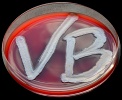| Species/Subspecies: | Yersinia ruckeri | ||||||||
|---|---|---|---|---|---|---|---|---|---|
| Categories: | Causes hemolysis; in the normal flora; notifiable diseases and bacteria | ||||||||
| Etymology: | Genus name: named after the French bacteriologist A.J.E. Yersin, who in 1894 first isoleted the bacterium which causes the plague. Species epithet: named after R.R. Rucker, who studied the red mouth disease and its causative agent. | ||||||||
| Significance: | The disease has been has been found in farmed fish since 1985 in Sweden and recently also in wild fish. [Of minor importance] |
||||||||
| Taxonomy: | Class Gammaproteobacteria Order Enterobacterales Family Yersiniaceae Genus Yersinia |
||||||||
| Type Strain: | ATCC 29473 = CCUG 14190 = NCTC 12986 | ||||||||
| Macromorphology (smell): | Small (0.5-1 mm in diameter) white greyish colonies | ||||||||
| Micromorphology: | Motile rods (1 x 2-3 µm) with peritrichous flagella | ||||||||
| Gram +/Gram -: | G- | ||||||||
| Metabolism: | Facultatively anaerobic | ||||||||
| Catalase/Oxidase: | +/- | ||||||||
| Other Enzymes: | Tryptophanase - and urease - | ||||||||
| Fermentation of carbohydrates: | Glucose(gas) -, Mannitol +, Rhamnose -, Sorbitol - and Sucrose -. Cf. other Yersinia spp. | ||||||||
| Spec. Char.: | |||||||||
| Special Media: | |||||||||
| Vector: | Certain other fish species | ||||||||
| Disease: | Enteric redmouth (ERM) disease (or just redmouth disease) or yersiniosis |
||||||||
| Hosts: | Freshwater and marine fish, particularly salmonids | ||||||||
| Clinical Picture: | Subcutaneous hemorrhaging of the mouth, fins, and eyes and also on internal organs. | ||||||||
| Virulence Factors: | Produce a so-called siderophore (for iron uptake) called ruckerbactin. | ||||||||
| 16S rRNA Seq.: |
| ||||||||
| Taxonomy/phylogeny:
|
Within the genus Yersinia, 20 species have been described. All species belong to the family Enterobacteriaceae. | ||||||||
| Comment: | Red mouthe disease is a notifyable disease in Sweden. | ||||||||
| Reference(s): | No. 174 | ||||||||
| Updated: | 2023-03-29 |
